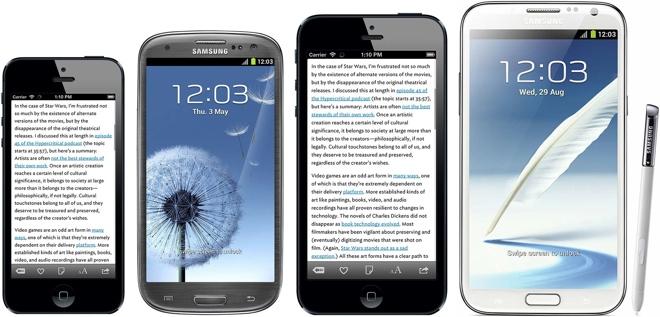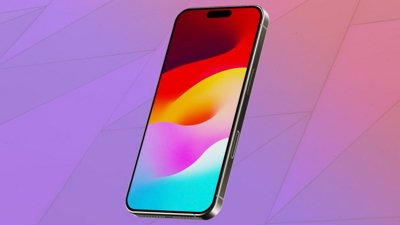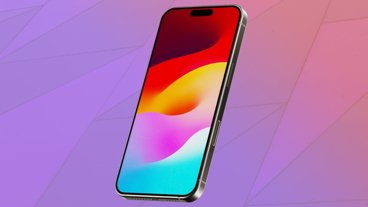In his keynote interview kicking off the Goldman Sachs Technology and Internet Conference on Tuesday, Apple CEO Tim Cook discounted the appeal of OLED displays while simultaneously appearing cagier than he's previously been when responding to questions on whether Apple should develop an iPhone with a larger screen in order to address competition.
Mockup of iPhone with 4.94-inch screen, created by Marco Arment.
"I don't want to say what we will do or won't do," with regard to screen size, Cook said, in what appeared to be a slight change of tune on the subject.
In the past, Cook had been more firm in his responses regarding screen size. Asked about the issue during the company's quarterly conference call just last month, Cook seemed almost dismissive of larger-screened handsets.
"We put a lot of thinking into screen size," he said, "and believe me, we've picked the right one."
In speaking of Apple's approach to the evolution of the iPhone and mobile devices in general, Cook largely criticized competitors who he believes are largely repeating the mistakes of the past:
Let me compare to the PC industry. Over the years, the way companies competed were two things: specs and price. People wanted to say, I've got the largest drive and fastest processor. In the camera business, people began to talk about megapixels. The truth is customers want that a-ha moment, and that's rarely a function of those things.
For its part, Cook said, Apple has instead chose to focus on the entire iOS experience, not particular specs.
"Do you know the speed of an AX Processor?," he asked. "You probably don't. Does it matter? You want a fantastic experience."
Cook went on to equate the screen size race among Apple's competitors to the specs race in the PC industry. He expressed confidence that Apple is on the right track with the Retina display featured in its iPhones and discounted the notion that OLED displays would deliver an improved experience for Apple customers due to their "awful" color saturation.
"If you ever buy anything online and really want to know what he color is, as many people do, you should really think twice before you depend on the color from an OLED display," he said in a swipe at rivals like Samsung, which uses OLED displays on its Galaxy S3 smartphone.
"There are many attributes to the display, and what Apple does is sweat every detail," he said. "We care about all of them and we want the best display, and I think we've got it." He immediately followed that, though, by repeating: "I'm not going to talk about what we're going to do in the future."
Apple's most recent phone, the iPhone 5, introduced a 4-inch Retina Display, a departure from the 3.5-inch screens featured on previous iPhones. The unit has seen strong sales, but industry observers believe the company is missing an opportunity in not introducing a larger-screened phone to compete with many Android devices.
Recently, rumors have surfaced that the company is in fact working on a larger-screened device to debut some time over the summer, currently dubbed by industry watchers as the "iPhone +"
 Kevin Bostic
Kevin Bostic

-m.jpg)






 William Gallagher
William Gallagher
 Andrew O'Hara
Andrew O'Hara
 Wesley Hilliard
Wesley Hilliard

 Malcolm Owen
Malcolm Owen
 Marko Zivkovic
Marko Zivkovic

 Chip Loder
Chip Loder



-m.jpg)




60 Comments
IOS experience needs to be updated and I'm looking at you iTunes/videos/music app. Also multitasking on iPad.
IOS experience needs to be updated and I'm looking at you iTunes/videos/music app.
Also multitasking on iPad.
Oh, didn't you hear, Tim cook announced that there won't be any more updates to iOS. Sorry.
Well, the OLED expert they just hired might not be happy to hear this ;-)
IOS experience needs to be updated and I'm looking at you iTunes/videos/music app.
Also multitasking on iPad.
The regulars here say that iOS already has all the multitasking it could ever need, ever since v1.0. What more could anyone possibly want?
IOS experience needs to be updated and I'm looking at you iTunes/videos/music app.
Also multitasking on iPad.
Yes, please, tell us more about how iOS is the worst thing to ever be put on any sort of storage but refuse to actually explain what's wrong with it…
All iOS devices already have multitasking. Get over it.